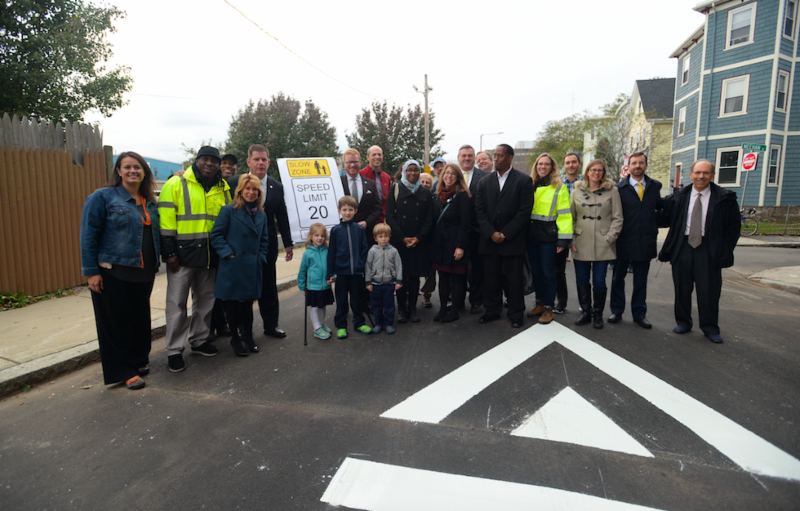MAYOR WALSH GRANTS $2 MILLION TOWARDS JACKSON SQUARE RECREATIONAL CENTER
|
Joins nonprofit Urban Edge to support the building of community center with turf field, ice rink and educational programs for neighborhood
|
BOSTON - Wednesday, November 1, 2017 - Mayor Martin J. Walsh today joined nonprofit developer Urban Edge, elected officials, community advocates, and local youth to grant $2 million towards the building of the Jackson Square Recreational Center. The Jackson Square Recreational Center will be two-stories high and include a turf field, an ice rink and spaces to study, meet, and complete homework.
"Recreational centers provide crucial spaces in our communities for young people and families to learn, grow, meet up with friends and have fun," said Mayor Walsh. "The City of Boston strives to provide opportunity in every neighborhood, and with so many young people living around Jackson Square, it was an easy choice to contribute these funds to this important and inspiring project. I want to thank all Urban Edge and our partners in working together to make this recreation center a reality."
Plans for the year-round Jackson Square Recreational Center include a regulation-size ice rink on the first floor and a turf field of equivalent size on the second floor, with both organized and unstructured recreational activities. The ice rink, turf fields, and meeting spaces will be open to the community and will also host Boston Public Schools (BPS) athletics, youth soccer, an adult ice hockey league, educational programming and homework help for both the at-large community and BPS students.
"Thank you to Mayor Marty Walsh for this generous $2 million gift from the City of Boston to build the Jackson Square Recreation Center," said Frank Shea, Urban Edge's Chief Executive Officer. "The city joins the U.S. Environmental Protection Agency, the Commonwealth of Massachusetts, and other private donors in becoming a partner on this important project. With this gift, we are closer to providing high quality recreational opportunities for the 26,000 young people who live in and around Jackson Square."
This year, the lease for Old City Hall was transferred, and as part of the agreement, the City and the Boston Planning & Development Agency secured $2 million as an administrative fee for the lease assignment. That $2 million in funds will be given to Urban Edge for the Jackson Square Recreational Center through a grant from the Boston Centers for Youth & Families (BCYF).
"I am looking forward to when the Jackson Square Recreation Center is open, and young people like me can have an affordable, accessible place in our community where they can hang out," said Ayan Ahmed, 17, a resident of Academy Homes. "It means something that people like Mayor Walsh are making sure that the young people living in Jackson Square are getting the resources that other neighborhoods have."
"There are other community centers around the city, but a lot of kids don't feel comfortable going to those places because they don't know anyone there," said Oriana Heredia, 16, a resident of Jackson Commons. "The Jackson Square Recreation Center will feel a lot more like home to me and my friends. I can't wait to come to the rec center to skate, have fun, and hang out with my friends."
The project, which will cost $30.6 million in total to complete, has now reached its public fundraising goal and is working with the Boston business community to secure another $6.8 million from private funders to complete the center.
Today's announcement builds on the goals laid out in Imagine Boston 2030, Boston's first citywide plan in 50 years, which calls for enhanced neighborhoods that include fostering community gathering spaces that strengthen social connectivity. For more information on Imagine Boston 2030, please visit here.
|




